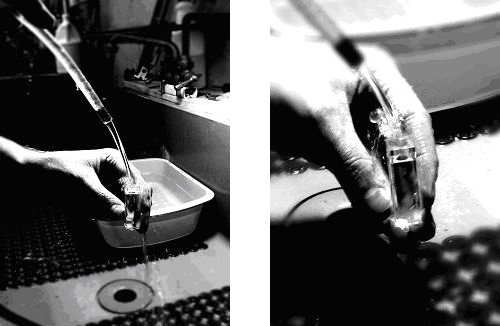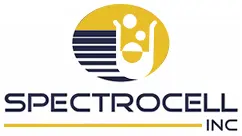Care of Spectrophotometer Cells

Cells are precision optical equipment and great skill and care goes into their manufacture. We make great efforts to ensure uniformity and conformance to exacting tolerances and standards of workmanship. Every person at Spectrocell is well aware of these standards and dedicated to maintaining them. The optical windows and other cell components undergo dozens of inspection procedures from certification of raw material to matching and packaging of the finished cells.
General use will gradually degrade the precision surfaces of the windows until significant reductions in transmittance occur due to light scattering. Misuse will speed up this process. The type of solvents used is also a factor. The more alkaline or acidic solvent will eventually degrade the hardest glass or quartz cells. Complaints about cell matching have been traced to improper cleaning or handling of cells.
Borosilicate glass and fused quartz used in our cells is fairly inert and resists a great many chemicals. However, with an increase in temperature the solvent used, as well as the glass or quartz surfaces of the cell, will become more chemically reactive, generally in proportion to the increase As the optical surfaces become more chemically active, they can eventually react and may pit or devitrify, that is, combine with nitrates, oxides, sulfates, hydroxides, or amines. This may appear as a small pit, or discolored spot, which cannot be removed.
Cell windows should be carefully cleaned and free of contaminants that could degrade performance. At Spectrocell, every effort is made to supply cells that are exceptionally clean. In order to keep them that way, the user should take certain precautions. Never allow cells to stand with solution in them. As soon as possible after testing, rinse the cells with pure, clean solvent. Follow this immediately with a warm water jet to remove all traces of solvent. Next, rinse carefully with a dilute detergent. Soft cotton swab can be used to scrub the inside of the cell, using only gentle pressure. Rinse with the purest water available.
Do not blow dry cells with compressed air. In our plant we blow dry with filtered nitrogen or dry in a desiccator. If you are working in a very clean environment, blow drying may not be necessary.
Do not use an ultra-sonic cleaner; even cells which are fully thermally fused are at risk in ultra-sonic cleaner. Never allow cells with tap water on them to air dry. Use a final rinse of deionized water. Finally, when tests are complete, store your cells in the boxes provided.
Please contact us if you need any further assistance with the care of our spectrophotometer cells.



